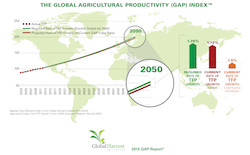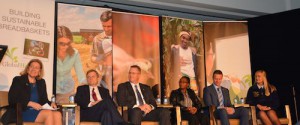 The global productivity of agriculture has stagnated for the second year in a row and productive, sustainable agriculture must be a priority. This was one of the main findings of the 6th annual Global Agricultural Productivity Report: Building Sustainable Breadbaskets (#GAPReport2015) released by the Global Harvest Initiative (GHI) today during the World Food Prize taking place this week in Des Moines, Iowa. The authors of the report caution that unless this trend is reversed the world may not succeed in sustainably providing food, feed, fiber and biofuels needed for growing worldwide population.
The global productivity of agriculture has stagnated for the second year in a row and productive, sustainable agriculture must be a priority. This was one of the main findings of the 6th annual Global Agricultural Productivity Report: Building Sustainable Breadbaskets (#GAPReport2015) released by the Global Harvest Initiative (GHI) today during the World Food Prize taking place this week in Des Moines, Iowa. The authors of the report caution that unless this trend is reversed the world may not succeed in sustainably providing food, feed, fiber and biofuels needed for growing worldwide population.
To meet food production goals over the next few decades, global agricultural productivity must increase by 1.75 percent per year. It is estimated there will be 9.7 billion people in 2050 with 40 percent of the growth taking place in Sub-Saharan Africa.
According to GHI’s annual assessment of productivity growth – the GAP Index™ – the current rate of growth is only 1.72 percent. The rate of annual productivity growth in low-income countries is much lower, at an average of 1.5 percent. At this rate, 15 years from now (2030) sub-Saharan Africa will only be able to meet 14 percent of its food demand, driving up food prices for poor households and requiring significant imports, food assistance, and opening up environmentally sensitive land for agricultural production. Productivity growth is also slowing down in the U.S.- a key U.S. economy driver providing $2 trillion in annual revenue.
“Raising global agricultural productivity requires long-term investments in the research and development of science-based agricultural technologies, agricultural extension services and education for farmers around the world, efficient transportation and telecommunications infrastructures, and support for the next generation of farmers,” said Dr. Margaret Zeigler, Executive Director of GHI during her introduction remarks during the report launch. “We also need agreements for better facilitation of global and regional trade and we must prioritize agriculture technologies and practices that help mitigate climate change and conserve natural resources.”
This year’s GAP Report highlights the legacy of U.S. agriculture and conservation system and also shines a spotlight on Zambia, a country leading the way in diversifying its agricultural production systems in a sustainable way. Zambia is working to become a regional breadbasket in southern Africa. The report also stresses that significantly more investments must be made globally, especially among small farmers and women farmers to enable growers to grow more with less.
Listen to Dr. Margaret Zeigler’s introductory remarks here: Dr. Margaret Zeigler's GAP Report Remarks

From left to right: Dr. Margaret Zeigler, Executive Director, Global Harvest Initiative; Dr. Keith Fuglie, Economist, USDA Economic Research Service; Cory Reed, Vice President of the Intelligent Solutions Group, John Deere; Dr. Phyllis Muturi, Makerere University, Uganda and Embu University College, Kenya (AWARD Scholar, Iowa State); Colin Bletsky, Vice President of BioAg, Novozymes; and Ruth Ann Myers, National Vice President, Future Farmers of America (FFA).
Cory Reed, vice president of John Deere’s Intelligent Solutions Group expanded on the need to produce more with less. “By combining precision agriculture with advances in seed, fertilizer and bioagriculture technologies, we are able to “farm smart”, meaning farmers can produce more while also conserving and protecting soils, water, and the natural resource base.” Reed is also the Chair of the GHI Board of Directors.
During the event, a panel took place where participants discussed how to cultivate resilient food and agriculture systems in the U.S. and Zambia, and how the right policies and public-private partnerships advance resilience and help manage risk. Dr. Margaret Zeigler moderated and was joined by Colin Bletsky, Vice President of BioAg, Novozymes; Cory Reed, Vice President of the Intelligent Solutions Group, John Deere; Dr. Keith Fuglie, Economist, USDA Economic Research Service; Ruth Ann Myers, National Vice President, Future Farmers of America (FFA); and Dr. Phyllis Muturi, Makerere University, Uganda and Embu University College, Kenya (AWARD Scholar, Iowa State).
Listen to Kelly Winquist, John Deere, GAP Report 2015 remarks here: Kelly Winquist's GAP Report Remarks
Listen to Ann Steensland, Senior Associate with Global Harvest Initiative remarks here: Ann Steensland's GAP Report Remarks
Listen to Dr. Catherine Woteki, Under Secretary for Research, Education, and Economics and Chief Scientist, United States Department of Agriculture (USDA) closing remarks here: Dr. Catherine Woteki's GAP Report Closing Remarks
Listen to the panel discussion here: GAP Report Panel Discussion


